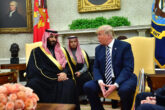
April 15, 2021
China’s Pursuit for Leadership in Digital Currency
Testimony Before the U.S.-China Economic and Security Review Commission
Submitted Written Testimony
I. Strategic Assessment
Vice Chairman Cleveland, Commissioner Wessel, and distinguished members and staff of the U.S.-China Economic and Security Review Commission, it is an honor to participate in today’s hearing. Please allow me to add that although I do consulting with the private sector on financial technology issues, my comments today are from my personal opinion and are not on behalf of any clients.
Digital Currency/Electronic Payment (DCEP), the People’s Bank of China’s state-based digital currency project is just one component of China’s long-term strategy to develop a fully digital economy and lead the world toward a future driven by harnessing intelligent, dynamic data systems. In the short run, the digital renminbi is likely to only have a marginal impact on the global economy and I assess that it is unlikely to displace the dollar as the top international reserve currency or undermine the power of U.S. sanctions in the next few years. However, in the long run, DCEP and China’s strategic approach to financial technology (fintech) is laying a technological foundation that could give China great economic advantage over the United States in the decades ahead.
In my statement, I will touch on China’s broader fintech strategy as a way to contextualize DCEP, explain what makes this digital currency unique as a fintech phenomenon, suggest how DCEP may fit into China’s blockchain technology efforts, and discuss what possible future scenarios could threaten the U.S.’ status as global financial leader. I will end with some recommendations on how U.S. policymakers and private sector stakeholders should respond.
Download the full testimony.
More from CNAS
-
Game Over?
The trade wargame suggests that sustained high tariffs could create leverage and urgency to spur action toward a productive restructuring of the international trade system....
By Emily Kilcrease & Geoffrey Gertz
-
Middle East Security / Energy, Economics & Security
Trump Inks $600 Bn Deal In Saudi Arabia | Musk, Blackrock CEO Flank Trump In Gulf VisitIn today's episode of India Global, U.S. President Donald Trump secured a $600 billion commitment from Saudi Arabia on Tuesday to invest in the United States. NDTV's Gaurie Dw...
By Daniel Silverberg
-
Energy, Economics & Security / Technology & National Security
Tariffs and Tech: An Uncertain RecipeHigher tariffs could prompt American cloud companies to shift more of their capital investments abroad....
By Pablo Chavez
-
Trump Tariffs: How Will U.S. Plans Reshape the Global Economy?
Donald Trump says he's already decided the tariffs he will impose on countries that export goods to America, including the United Kingdom. Channel 4 hears from Emily Kilcrease...
By Emily Kilcrease




